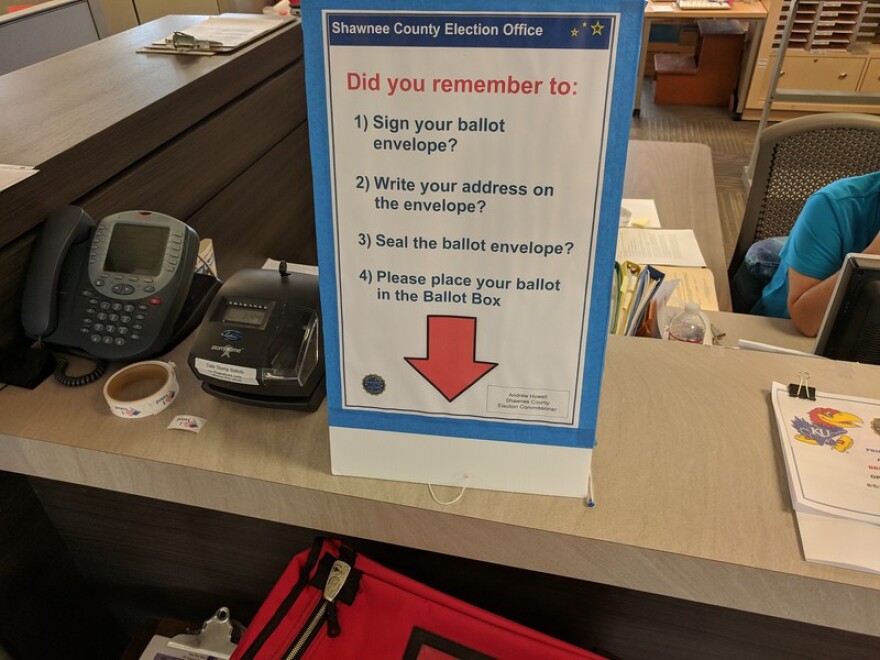TOPEKA, Kansas — Facing the prospect of standing in line at polling places amid the coronavirus pandemic, requests from Kansans for mail ballots continue to come in at a record clip.
As of June 17, more than 142,000 Kansans had filed applications for advance ballots for the Aug. 4 primary. That far exceeds the 54,000 requested at the same point in the last presidential election year.
Kansas Secretary of State Scott Schwab said the jump reflects worries about in-person voting, but he’s not willing to heed calls from state Democratic Party officials to switch to all-mail elections.
That would create “massive voter confusion,” said Schwab, a Republican preparing to oversee his first statewide election.
Five states — Colorado, Hawaii, Oregon, Utah and Washington — conduct all elections by mail. Other states may do so this year to prevent a surge in coronavirus cases.
Kansas Democrats conducted their May 2 presidential primary entirely by mail. They considered it such a success that State Party Chair Vicki Hiatt said Schwab should use a similar process for this year’s primary and general elections rather than putting “a whole lot of money into making provisions for safety.”
Schwab has the authority to alter elections. But he said he can only do so in emergencies that make it “impossible” for people to vote in person.
The threat posed by the coronavirus, Schwab said, doesn’t rise to that level, especially given the steps he and the state’s 105 county clerks are taking to make polling places safer.
They’re installing plexiglass shields at voter registration tables and stocking every polling place with masks, gloves and hand sanitizer. They’re also providing disposable styluses so that people don’t have to actually touch the screens of voting machines.
“We’re doing everything on our end to make it safe for voters,” Schwab said.
The state got $4.6 million in federal pandemic relief to pay for the modifications.
Harvey County Clerk Rick Piepho is worried that the volunteers he counts on to staff the county’s 12 polling places - many of them retirees - might also be reluctant to show up this year.
“Most of them are going to be in those higher-risk age groups,” Piepho said.
Piepho said those he’s talked to as he begins his recruiting push for the primary are relieved “that we’re putting in protections for them.”
Ballot security
President Donald Trump strongly opposes large-scale mail-in voting. He’s threatened to withhold federal funding from states seeking to expand it. Several times in recent months, he has said that such an expansion would invite widespread fraud.
At a White House press conference in early April, Trump called advance voting “a terrible thing” that would result in “thousands and thousands of people sitting in somebody’s living room singing ballots all over the place.”
Experts say while fraud is more of a problem in mail elections than in-person voting, it is still rare.
Schwab represents the conservative wing of his party. But he differs with Trump, saying mail-in elections don’t pose a serious fraud risk and that vote cheating, in general, is highly uncommon.
“That doesn’t mean it doesn’t happen,” he said. “But it’s very rare. And normally when people attempt it, they get caught.”
Kansas, Schwab said, has taken several specific steps to protect the security of mail-in ballots, including the implementation earlier this year of an online tracking system.
“It allows you to track your ballot to its destination,” Schwab said.
In addition, he said, many county election offices have secure drop boxes. Those allow voters to hand-deliver their ballots rather than handing them over to a third party to deliver in bulk.

Piepho, the Harvey County clerk, said the advance-voting process includes several safeguards. For one thing, he said, officials scrutinize the signatures on incoming ballots to make sure they match those on the applications.
“We check it to make sure it’s the same person,” Piepho said.
A poll released this month by the Kansas News Service found nearly half of the people in the state think voting by mail is safe. And that it should be encouraged. But nearly a fourth disagreed. Notably, Democrats were far more in favor of mail voting than Republicans.
Voters eager but nervous
A divisive presidential impeachment trial, disputes over how government entities at all levels responded to the pandemic and recent protests that exposed the racial divide over police tactics have upped the stakes in this year’s election.
In Kansas, the potential for a competitive race for a U.S. Senate seat that Republicans have owned since the Great Depression is adding to those stakes.
The jump in advance ballot requests, Schwab said, could indicate that Kansas voters will turn out in higher numbers this year.
"It's one of many indicators," he said.
The latest registration totals may be another signal.
As of June 1, more than 1.8 million Kansans had registered to vote, an increase of more than 100,000 from June of 2016.
It’s risky to draw too many conclusions, Schwab said, but those numbers suggest Kansas voters are engaged.
The number of registered Democrats has gone up to 468,805, compared to 425,879 four years ago. Republicans continue to hold a sizeable advantage with a registration total of 804,552. That’s up from 766,923 in June of 2016.
Meanwhile, the number of unaffiliated voters declined slightly to 553,673 from 534,035 in 2016.
Jim McLean is the senior correspondent for the Kansas News Service. You can reach him on Twitter @jmcleanks or email jim (at) kcur (dot) org.
The Kansas News Service is a collaboration of KCUR, Kansas Public Radio, KMUW and High Plains Public Radio focused on health, the social determinants of health and their connection to public policy.
Kansas News Service stories and photos may be republished by news media at no cost with proper attribution and a link to ksnewsservice.org.






